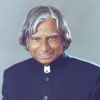Abdul Kalam

Abdul Kalam
Avul Pakir Jainulabdeen "A. P. J." Abdul Kalamwas the 11th President of India from 2002 to 2007. A career scientist turned politician, Kalam was born and raised in Rameswaram, Tamil Nadu, and studied physics and aerospace engineering. He spent the next four decades as a scientist and science administrator, mainly at the Defence Research and Development Organisationand Indian Space Research Organisationand was intimately involved in India's civilian space program and military missile development efforts. He thus came to be known...
ProfessionScientist
Date of Birth15 October 1931
CityRameswaram, India
On behalf of the Government and people of India and on my own behalf, I would like to convey to you and to the people of Pakistan our heartfelt sympathies.
We must think and act like a nation of a billion people and not like that of a million people. Dream, dream, dream!
Nations consist of people. And with their effort, a nation can accomplish all it could ever want.
It means, people who are in high and responsible positions, if they go against righteousness, righteousness itself will get transformed into a destroyer.
The world has today 546 nuclear plants generating electricity. Their experience is being continuously researched, and feedback should be provided to all. Nuclear scientists have to interact with the people of the nation, and academic institutions continuously update nuclear power generation technology and safety.
You see, God helps only people who work hard. That principle is very clear.
My impression of the American people can be summarized by a quotation from Benjamin Franklin, Those things that hurt instruct! I realised that people in this part of the world meet their problems head on. They attempt to get out of them rather than suffer them.
For me, there are two types of people: the young and the experienced.
My message, especially to young people is to have courage to think differently, courage to invent, to travel the unexplored path, courage to discover the impossible and to conquer the problems and succeed. These are great qualities that they must work towards. This is my message to the young people.
My government is committed towards creating such an environment so that the latent potential of our people can blossom and create a new India of our dreams.
Our nation is facing a major challenge of uplifting 260 million people who are below poverty line and we have to give better life for many millions who are on border line of poverty or just above the poverty line. To meet the needs of one billion people we have the mission of transforming India into a developed nation .... We have identified five areas where India has a core competence on integrated action for agriculture, food processing, education and health care, reliable and quality electric power, surface transport and infrastructure for all parts of the country, information technology and other strategic sectors.
The military will be testing for HIV in new recruits and undertake pre-natal examination of wives of personnel in the services,
The right signal is that technology is going to boost (economic) development of our nation,
The school hours for children are the best time for learning, and need the best environment and mission oriented learning with value based educational system.